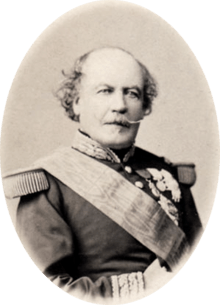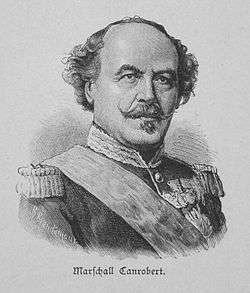François Certain Canrobert
| François Certain Canrobert | |
|---|---|
 François Certain-Canrobert | |
| Born |
27 June 1809 Saint-Céré, France |
| Died |
28 January 1895 (aged 85) Paris, France |
| Allegiance |
|
| Service/branch | French Army |
| Years of service | 1828–1873 |
| Rank | Maréchal de France |
| Battles/wars |
Conquest of Algeria Crimean War Franco-Prussian War |
| Awards | Legion of Honour (Grand Croix) |
François Certain de Canrobert, usually known as François Certain-Canrobert and later simply as Maréchal Canrobert (27 June 1809 – 28 January 1895), was a marshal of France.
Biography
His father, Antoine Certain de Canrobert, Knight of Saint Louis, was the scion of a relatively obscure family whose grandfather had been ennobled in 1738 (the senior branch of the family, extinct in 1918, used the surname "Certain de La Meschaussée"): he became a Royalist émigré and consequently his few properties were confiscated during the French Revolution and he was even briefly imprisoned in the Temple in 1801. His mother was born Angélique de Niocel, also from a family of recent nobility (her grandfather had been ennobled in 1775 and her brother married a niece of Marshal Joachim Murat, brother-in-law of Napoleon).
The future Marshal was educated at Saint-Cyr; he received a commission as sub-lieutenant in 1828, becoming lieutenant in 1832.
Sent to Algeria in 1835, he served in the expedition to Mascara, at the capture of Tlemcen, and in 1837 was promoted to captain and then captain adjudant-major. In the same year he received the Légion d'honneur for courageous conduct. In 1839 he was employed in organizing a battalion of the French Foreign Legion for the Carlist Wars. In 1841 he was again serving in Algeria. Promoted lieutenant-colonel in 1846 and colonel of the 3rd regiment in 1847, he commanded the expedition against Ahmed Sghir in 1848, and defeated the Arabs at the Djerma Pass. Transferred to the Zouaves (1848–50), he defeated the Kabyles, and in 1849 displayed both courage and energy in reinforcing the blockaded garrison of Bou Saada, and in command of one of the attacking columns at Zaatcha (December 1849). For his valour on the latter occasion he received the rank of general of brigade and the commandership of the Legion of Honour. He led the expedition against Narah in 1850 and destroyed the Arab stronghold.

Summoned to Paris, he was made aide-de-camp to the president, Louis-Napoléon Bonaparte, and took part in the coup d'état of December 2, 1851. In the Crimean War he commanded a division at the Battle of Alma, where he was twice wounded. He held a dormant commission entitling him to command in case of Saint-Arnaud's death, and he thus succeeded to the chief command of the French army a few days after the battle. He was slightly wounded and had a horse killed under him at Inkerman, when leading a charge of Zouaves. Disagreements with the British commander-in-chief, Lord Raglan, and in general, the disappointments due to the prolongation of the siege of Sevastopol led to his resignation of the command, but he did not return to France, preferring to serve as chief of his old division almost up to the fall of Sevastopol.
After his return to France in August 1855 he was sent on diplomatic missions to Denmark and Sweden, and created a Marshal of France and a Senator for Life. He was also made grand cross Legion of Honour, and honorary Grand Cross in the Order of the Bath. He commanded the III Army Corps in Lombardy in 1859 during the Second Italian War of Independence, distinguishing himself at Magenta and Solferino. He successively commanded the camp at Châlons, the IV army corps at Lyon and the army of Paris.
During the Franco-Prussian War he commanded the VI army corps, which was almost annihilated at Mars-la-Tour and at the Gravelotte, where Canrobert commanded on the Saint-Privat position. The VI Corps was amongst those shut up in Metz and included in the surrender of that besieged fortress.
After the war Canrobert was appointed a member of the superior council of war, and was also active in political life, being elected Senator for Lot in 1876 and for Charente in 1879 and again in 1885. He died in Paris and was buried in the Hôtel des Invalides, receiving a state funeral: due to Canrobert's role in the coup of December 1851 and in the French defeat at Metz, it provoked protests from a deputy of the left, Gustave Hubbard, who was subsequently badly wounded during a duel by Canrobert's firstborn son.
The Marshal married in 1863 Leila-Flora MacDonald, daughter of a captain of the British army and a great granddaughter of the Jacobite heroine Flora MacDonald. They had a daughter and two sons.
His memoirs (Souvenirs) were published in 1898 at Paris.
References
| Wikimedia Commons has media related to François Certain Canrobert. |
 This article incorporates text from a publication now in the public domain: Chisholm, Hugh, ed. (1911). "Canrobert, François Certain". Encyclopædia Britannica (11th ed.). Cambridge University Press.
This article incorporates text from a publication now in the public domain: Chisholm, Hugh, ed. (1911). "Canrobert, François Certain". Encyclopædia Britannica (11th ed.). Cambridge University Press.